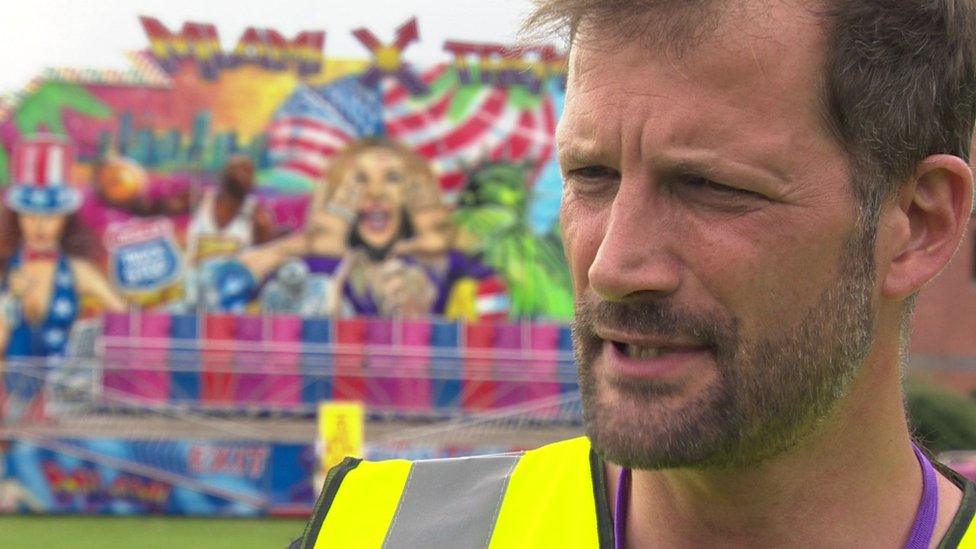Viola Beach band crash 'awful tragedy', says coroner
- Published

This picture of Viola Beach was taken just before the band's gig prior to the crash
A coroner has said he does not think it will "ever be known" what caused the crash that killed the British group Viola Beach and their manager.
The four-member band, who were aged between 19 and 27, died on 13 February following a gig in Sweden.
Their car crashed into a raised section of a bridge and plummeted into a canal.
Addressing the deceased men's families, Cheshire Coroner Nicholas Rheinberg described the crash as "the most awful tragedy".
He ruled that manager Craig Tarry, 32, and band members River Reeves, Jack Dakin, Kris Leonard - all aged 19 - died due to head injuries.
Bass guitarist Tomas Lowe, 27, died due to drowning, the inquest in their Warrington hometown found.
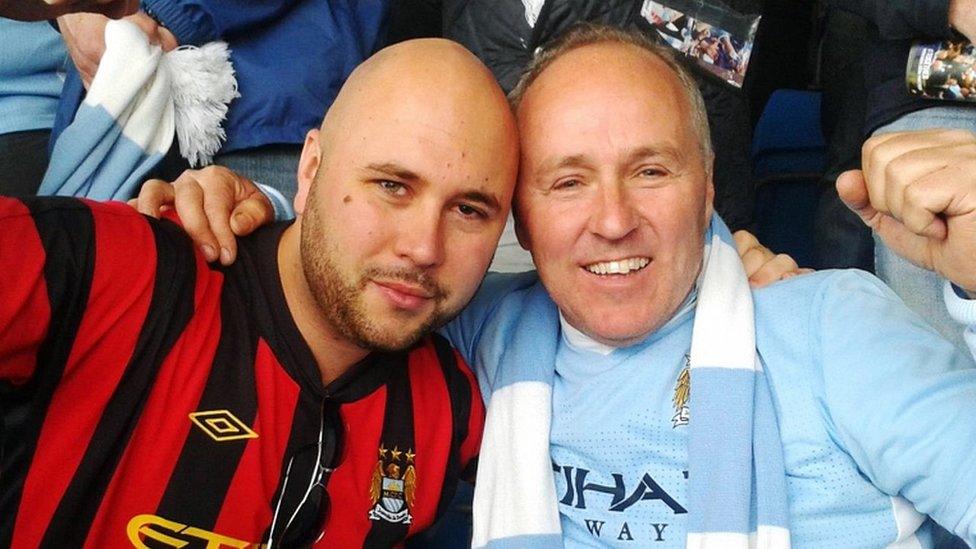
Manager Craig Tarry (left), seen here with his father Colin at a Manchester City match, was driving the car
Mr Rheinberg said: "It's not for me to speculate... I don't think it ever will be known what happened."
He added that "the evidence did not reveal the cause of sequence of events" that led to their deaths.
The inquest heard no alcohol or drugs was found in the blood of Mr Tarry, who was driving the band to the airport hotel where they were staying.
Warning lights
Post-mortem examinations also showed the four band members had not taken drugs and had only consumed small amounts of alcohol.
The group's agent Graham Bennett told Warrington Coroner's Court that the up-and-coming band were in Sweden for the Where's The Music? festival showcasing young artists.
Mr Tarry drove past queuing traffic and crashed through barriers, the court heard.
Viola Beach had already played at the Reading and Leeds festivals last year and the event in Norrköping was their first gig outside the UK.
After the performance, they were travelling in a black Nissan Qashqai near the Södertälje Canal, about 18 miles from Stockholm, when a bridge was raised to let a boat pass underneath.
The inquest heard that the car was slightly over the speed limit as it was travelling at 108km/h (67mph) in a 100km/h zone.
Flashing lights signalled that the bridge was about to be raised with the middle section of the road lifted horizontally, the inquest heard.
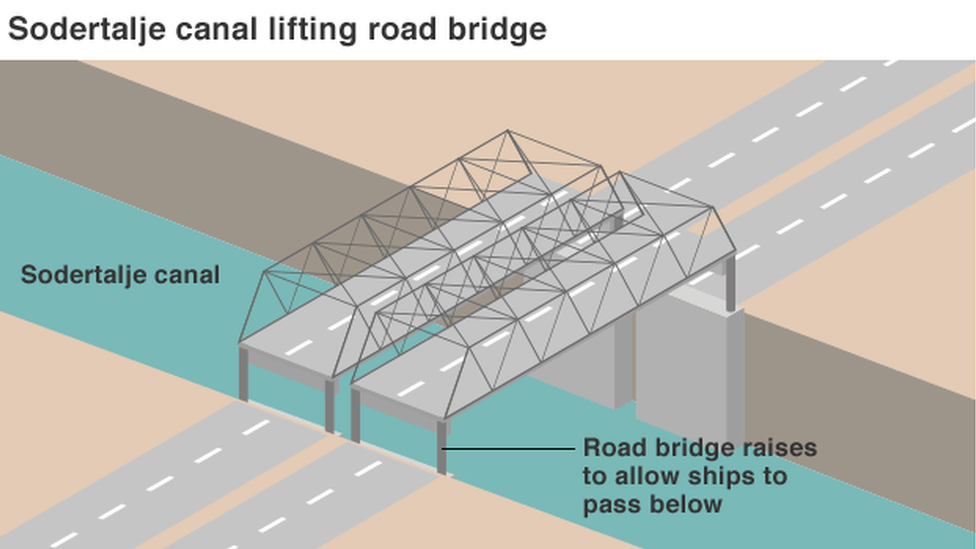
Mr Tarry drove down a verge past stationary queuing traffic, clipping the wing mirror of a taxi, and through the first set of barriers - about 120m from the bridge - the court heard.
The car then travelled in a "controlled manner" at between 70 and 90km/h (43 and 55mph) down the centre of the road.
It continued through a second set of barriers - 30m from the drop into the canal - and hit the underside of the raised section of the bridge before plummeting 25m, hitting the water within 15 seconds.
The vehicle turned in flight - the back of the car hitting the water at 54mph before sinking eight metres to the bottom of the canal.

River Reeves, Kristian Leonard, Tomas Lowe and Jack Dakin died along with their manager in a crash
A tanker using the canal, which had requested the bridge to be lifted, then passed over the crash spot and "contact" with the car could not be ruled out, the court heard.
The crew of a passing boat saw the car fall but initially thought it was ice.
The alarm was raised when police were informed of car parts and damaged barriers on the road. They then realised a car had gone into the canal.
The court heard that the three band members who were sitting in the back of the car were not wearing seat-belts and were thrown from the car.
Mr Tarry and Mr Leonard, who were seat-belted in the front, had to be cut from the vehicle.
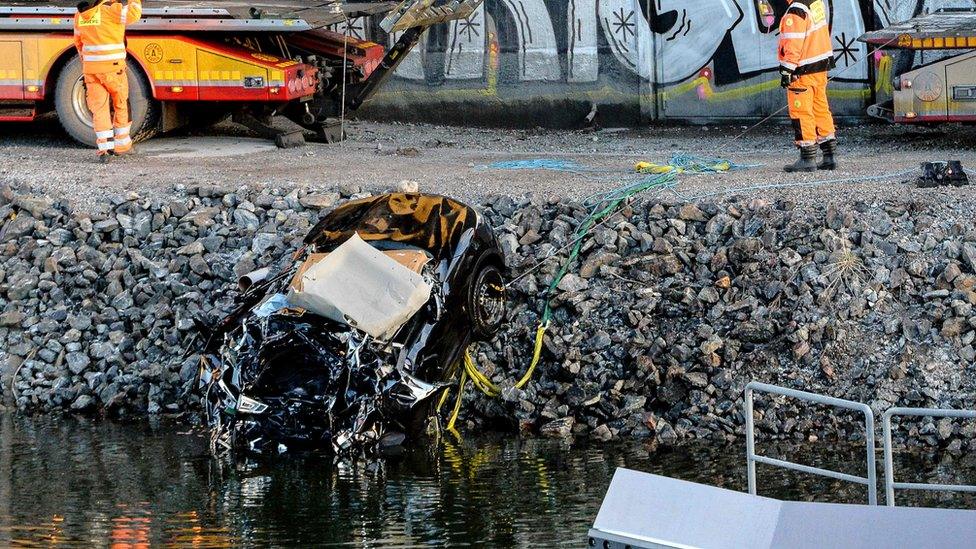
The car was towed from the canal under a bridge outside Stockholm
Technical examinations did not find any errors with the car, barrier system or the procedure for raising the bridge.
One warning light on the bridge was out of order but there were at least 10 warning lights and flashing signals, the inquest heard.
Although the road was wet, it was not frozen with ice.
Mr Rheinberg said there were "frustrating missing gaps" and that he was not able to demand information from Swedish authorities as he could from British organisations.
Families' gratitude
Supt Martin Cleworth, from Cheshire Police, said outside the Warrington court, external: "We don't know the final answer... in terms of what actually happened at those moments just prior to the final collision and tragic descent into the water."
"We have given a commitment to continue to work with the coroner and the families to try and seek to understand some other issues that came from the inquest.
"Those questions are unlikely to actually ever get to that fundamental fact as to what went on in the seconds leading to the tragic collision."
Speaking on behalf of the deceased men's families, he added: "The families of River, Tom, Jack, Kris and Craig wish to thank everybody for their kind support at this heartbreaking time and the support they have shown over the last 10 months."
The Swedish authorities have recommended improvements to the crossing, including LED signs and cameras on the bridge.
More than 20 relatives of the deceased men attended Wednesday's inquest.

Who were Viola Beach?
Viola Beach play Swings & Waterslides in session for BBC Introducing
Four-piece band from Warrington, Cheshire
Kris Leonard, 19 - guitar, lead vocal; River Reeves, 19 - who grew up in Cornwall, guitar; Tomas Lowe, 27 - bass; Jack Dakin, 19 - drums
Formed in May 2015
Released debut single Swings & Waterslides last year and put out their second single Boys That Sing on 22 January
Played several BBC Introducing sessions
Were due to travel to the South By South West (SXSW) festival in Texas in March 2016

In the wake of their deaths, the band's first single Swings & Waterslides reached number 11, while their song Boys That Sing was performed by Coldplay in a tribute at Glastonbury.
Posthumously, Viola Beach scored a number one album in August.
The self-titled debut was compiled by the band's families, using live sessions and studio recordings, many of which were originally bound for an EP.
After the crash, a statement from the families of the band said: "We are tremendously proud of everything the boys achieved in such a short space of time.
"Craig, Jack, Kris, River and Tom shared a huge passion, talent and dedication to music."
- Published14 February 2016
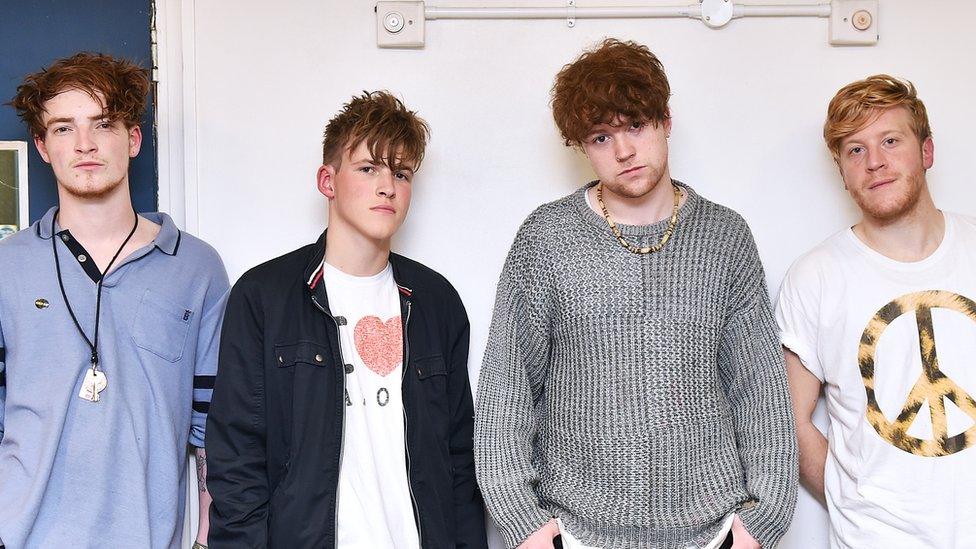
- Published5 August 2016

- Published24 July 2016
